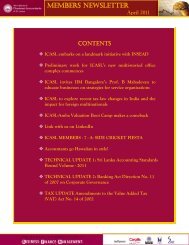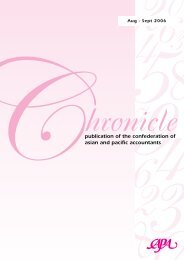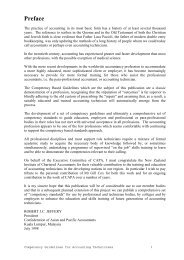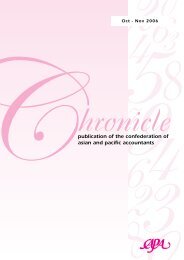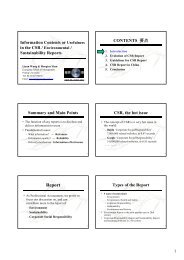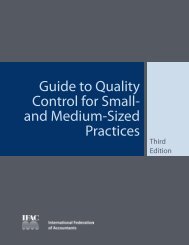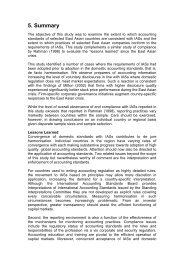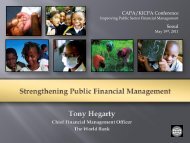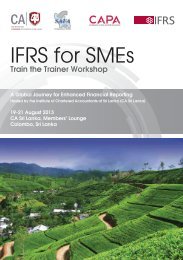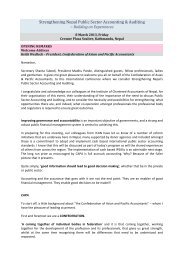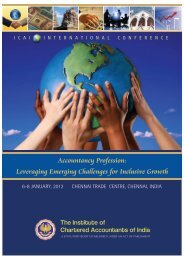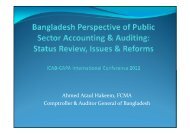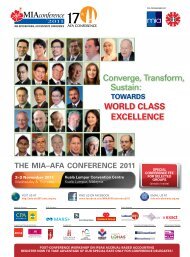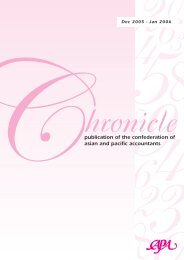Annual Report 2012 - Confederation of Asian and Pacific Accountants
Annual Report 2012 - Confederation of Asian and Pacific Accountants
Annual Report 2012 - Confederation of Asian and Pacific Accountants
You also want an ePaper? Increase the reach of your titles
YUMPU automatically turns print PDFs into web optimized ePapers that Google loves.
5Strategies• Two new committees established to focus on outreachactivities <strong>and</strong> thought leadership involving:- PAO Development- Public Sector Financial ManagementTerms <strong>of</strong> reference <strong>and</strong> initial strategies <strong>and</strong> work programsestablished• “Improving Public Sector Accounting <strong>and</strong> Auditing”conference held in Dhaka, Bangladesh, attended by over400 local <strong>and</strong> international delegates, including manygovernment <strong>of</strong>ficials, <strong>and</strong> a keynote address by the FinanceMinister <strong>of</strong> Bangladesh• “Accounting Services Forum” held in Beijing, China as part<strong>of</strong> the China Beijing International Fair for Trade in Services.The Fair was attended by over 100,000 delegates, <strong>and</strong> theForum attracted nearly 600 local <strong>and</strong> international delegates• “The Vital Role <strong>of</strong> Pr<strong>of</strong>essional Accountancy Organisations”conference held in Hanoi, Vietnam, attended by over 100local <strong>and</strong> international delegates• Staged a PAO development Seminar in Hanoi, Vietnam,attended by representatives <strong>of</strong> PAOs from 18 jurisdictions,including developing countries neighbouring Vietnam• Outreach visit to Vietnam included meeting with the FinanceMinister <strong>of</strong> Vietnam• Assisted, supported, <strong>and</strong> contributed at meetings <strong>of</strong> IFAC’sPAO Development Committee, including meetings with thedonor community concerning the Memor<strong>and</strong>um <strong>of</strong>Underst<strong>and</strong>ing to Strengthen Accountancy <strong>and</strong> ImproveCollaboration (MOSAIC)THE YEAR INOperations & Finance• Members <strong>and</strong> Board gathered for meetings in:- Beijing, China – 52 attendees- Sri Lanka – 47 attendees2 12SUMMARY• World Bank representatives joined CAPA at all events inBangladesh <strong>and</strong> Vietnam• Staged a Public Sector Roundtable event in Sri Lankaattended by 22 participants, comprising representativesfrom the Sri Lanka public sector <strong>and</strong> accounting pr<strong>of</strong>ession,as well as members <strong>of</strong> CAPA’s Public Sector FinancialManagement Committee• Promoted the importance <strong>of</strong>, <strong>and</strong> need to pr<strong>of</strong>essionalise,accounting technicians within the region during anAccounting Technicians Forum in Sri Lanka• “International Conference on Integrated <strong>Report</strong>ing” held inSri Lanka attended by over 300 local <strong>and</strong> internationaldelegates. Debated challenges <strong>and</strong> opportunities to assist inthe development <strong>of</strong> integrated reporting• Signed a Grant Agreement with the World Bank to undertakea capacity building project focused on improving ContinuingPr<strong>of</strong>essional Development (CPD) systems in Mongolia,Philippines <strong>and</strong> Vietnam• Supported Small-<strong>and</strong>-Medium-sized Practices (SMPs),attended Global IFAC SMP Forum in Singapore <strong>and</strong>promoted the global ‘IFAC SMP Quick Polls’ aimed atunderst<strong>and</strong>ing the needs <strong>and</strong> challenges facing SMEs(enterprises) <strong>and</strong> SMPs• Met <strong>and</strong> liaised with IFAC, other regional organisations <strong>and</strong>accounting groupings, <strong>and</strong> PAOs to promote st<strong>and</strong>ards <strong>and</strong>share knowledge for the benefit <strong>of</strong> Members• Committee representatives <strong>and</strong> technical advisors gathered for meetings in:- Dhaka, Bangladesh – 21 attendees- Hanoi, Vietnam – 17 attendees• Undertook detailed risk management review, identifying the key risks to CAPA achieving its vision<strong>and</strong> mission, <strong>and</strong> ensuring strategies <strong>and</strong> controls are in place to effectively manage the risks <strong>and</strong>opportunities• Continued a Membership Review to consider the most appropriate membership model to achieve theorganisation’s vision <strong>and</strong> mission• Continued the development <strong>of</strong> a Governance & Policies Manual. Over 30 policy statements now drafted• Issued inaugural ‘Members Satisfaction Survey’ to assist a regime <strong>of</strong> continuous improvement• Achieved a better than budget outcome, whilst undertaking additional unplanned activitiesWhat is CAPA?The <strong>Confederation</strong> <strong>of</strong> <strong>Asian</strong> <strong>and</strong> <strong>Pacific</strong> <strong>Accountants</strong>(CAPA) is a regional organisation representing nationalpr<strong>of</strong>essional accountancy organisations (PAOs) in Asia-<strong>Pacific</strong>. These PAOs, referred to as CAPA’s Members, representover 1 million accountants across the region.The global accountancy pr<strong>of</strong>ession is represented by theInternational Federation <strong>of</strong> <strong>Accountants</strong> (IFAC), <strong>and</strong> CAPA isone <strong>of</strong> four recognised regional organisations. The Asia-<strong>Pacific</strong>region is the largest by geographical spread. Members spanfrom Mongolia to New Zeal<strong>and</strong> <strong>and</strong> from Pakistan to Canada.Members come from countries <strong>of</strong> greatly varying populations,with a wide variety <strong>of</strong> cultures.CAPA has a unique role within the accountancy pr<strong>of</strong>ession,positioned between IFAC representing the global pr<strong>of</strong>ession,<strong>and</strong> the national PAOs representing the pr<strong>of</strong>ession in eachcountry. Accordingly, CAPA assumes a role <strong>and</strong> undertakesinitiatives <strong>and</strong> activities that it is better placed to do than eitherIFAC or the PAOs.The Role <strong>of</strong> CAPACAPA provides the structure toenable relationship building<strong>and</strong> knowledge sharingamongst PAOs in the region, <strong>and</strong>to undertake specific activitiesconsistent with the organisation’svision <strong>and</strong> mission.CAPA has limited resources <strong>of</strong> itsown, but the Members, collectively,have significant resources. CAPA’srole is to harness this resource, <strong>and</strong>in collaboration with Members, setabout achieving the mission <strong>of</strong> CAPA.Our HistoryThe idea <strong>of</strong> CAPA was conceivedat the First Far East Conference<strong>of</strong> <strong>Accountants</strong> held from 28November to 1 December 1957, inManila, Philippines. It was the firstconference <strong>of</strong> such magnitude that washeld in the region with 20 organisationsfrom 15 jurisdictions participating.One third <strong>of</strong> these jurisdictions didnot have any national accountingorganisation <strong>and</strong> thus the idea <strong>of</strong> forminga formal confederation <strong>of</strong> accountingTHE ACCOUNTANCY VOICE FORTHE ASIA-PACIFIC REGIONCAPA’s mission is supported by mediumto long-term strategies <strong>and</strong> short-termwork plans. These encapsulate bothpublic <strong>and</strong> private sectors, <strong>and</strong> all facets<strong>of</strong> the accounting pr<strong>of</strong>ession.Values establish an organisation’s culture<strong>and</strong> provide an anchor point <strong>and</strong>framework to underpin stakeholdersworking together <strong>and</strong> taking decisions.For an organisation representing <strong>and</strong>involving over 30 PAOs across 23jurisdictions, each with distinct cultures,establishing a clear identity to which allbodies was deferred. Recognising theneed for the exchange <strong>of</strong> ideas <strong>and</strong>information on a regional basis, theparticipants agreed to hold regularconferences.At the next conference held from 31March to 2 April 1960, in Canberra<strong>and</strong> Melbourne, Australia the groupingwas renamed as the <strong>Confederation</strong> <strong>of</strong><strong>Asian</strong> <strong>and</strong> <strong>Pacific</strong> <strong>Accountants</strong> as morejurisdictions joined the confederation. In1976, CAPA adopted a formal charterGlobal OrganisationRegional Organisation in Asia-<strong>Pacific</strong>31 PAOs are Members <strong>of</strong> CAPA(see list on pages 18 & 19)Pr<strong>of</strong>essional Accountancy OrganisationsMembers can subscribe is importantfor CAPA to be effective. We expectall our stakeholders to share <strong>and</strong>demonstrate the following values:• Trust• Respect• Cooperation• Inclusiveness• Positive Attitude• Excellence• Kaizen<strong>and</strong> established an Executive Committee(now the Board) to carry out activities inline with its newly established mission<strong>and</strong> objectives.As at 31 December <strong>2012</strong>, CAPA hasa membership <strong>of</strong> 31 accountancyorganisations in 23 jurisdictions. It isone <strong>of</strong> the four Regional Organisationsrecognised by IFAC. The otherrecognised Regional Organisationscover the continents <strong>of</strong> Africa, Europe<strong>and</strong> the Americas.
LIVING THE MISSIONThe work <strong>of</strong> CAPA spans all <strong>of</strong> the elements <strong>of</strong> the Mission statement being,to develop, coordinate <strong>and</strong> advance the accounting pr<strong>of</strong>ession in the region.Meetings, events <strong>and</strong> activities address many <strong>of</strong> the elements, either separatelyor simultaneously.In <strong>2012</strong>, CAPA held a total <strong>of</strong> fifteen (15) Members, Board or committee meetings,<strong>and</strong> a total <strong>of</strong> seven (7) associated events, taking the form <strong>of</strong> conferences, seminars,roundtables or forums. This was a significant increase on previous years <strong>and</strong> each arediscussed extensively in the pages that follow.In late 2011 it was decided to give emphasis for the immediate future on two particularmatters:• Assisting PAOs develop, grow <strong>and</strong> mature; <strong>and</strong>• Improving public sector financial management across the regionThese elements are highlighted below within our Vision & Mission Statement <strong>and</strong> were<strong>of</strong>ten the focus <strong>of</strong> our events <strong>and</strong> activities during the year.Vision & Mission StatementGetting FocusedThe planned focus for the medium term led to the formation <strong>of</strong> the following twocommittees:• PAO Development Committee (PAODC)• Public Sector Financial Management Committee (PSFMC)The objectives <strong>of</strong> each <strong>of</strong> these committees were established during the year <strong>and</strong> are :PAO Development Committee• Facilitate relationships <strong>and</strong> activities that contributetowards the development <strong>of</strong> PAOs in the region• Identify <strong>and</strong> support development <strong>of</strong> relationships<strong>and</strong> partnerships with key stakeholders, particularlydonor agencies – globally, regionally <strong>and</strong> in countryPublic Sector FinancialManagement Committee• Identify <strong>and</strong> support the development <strong>of</strong> relationshipswith key stakeholders – globally, regionally <strong>and</strong> incountry• Promote the importance, value <strong>and</strong> benefits <strong>of</strong> highquality public sector financial management (PSFM)Vision - for the Pr<strong>of</strong>ession in the RegionA relevant <strong>and</strong> respected accounting pr<strong>of</strong>ession, trusted <strong>and</strong> valued by governments <strong>and</strong> businesses, <strong>and</strong> recognisedfor contributing to the development <strong>of</strong> sustainable financial markets <strong>and</strong> economies.• Identify <strong>and</strong> prioritise key regional <strong>and</strong> countryspecific needs <strong>and</strong> develop strategies <strong>and</strong> plansto address those needs• Identify <strong>and</strong> prioritise regional <strong>and</strong> country specificneeds with regard to PSFM <strong>and</strong> develop strategies<strong>and</strong> plans to address those needsVision - for CAPA (as an organisation)An inspirational leader for the accounting pr<strong>of</strong>ession in the region.Mission - for CAPATo develop, coordinate <strong>and</strong> advance the accounting pr<strong>of</strong>ession in the region, by:• Contributing to the formation <strong>and</strong> development <strong>of</strong>strong <strong>and</strong> sustainable pr<strong>of</strong>essional accountingorganisations capable <strong>of</strong> providing <strong>and</strong> maintainingaccountants to effectively meet the needs <strong>of</strong> thecountry in which they operate• Fostering a cohesive accounting pr<strong>of</strong>ession within theregion, by facilitating the development <strong>of</strong> relationships<strong>and</strong> sharing <strong>of</strong> knowledge amongst pr<strong>of</strong>essionalaccounting organisations• Promoting the benefits <strong>of</strong> high quality financialmanagement <strong>and</strong> reporting in public, not-for-pr<strong>of</strong>it<strong>and</strong> private sectors, including international st<strong>and</strong>ardsin accounting, audit, ethics <strong>and</strong> accounting education• Liaising with governments, regional <strong>and</strong> nationalorganisations to influence the development <strong>of</strong>public sector financial management• Liaising with international, regional <strong>and</strong> nationalorganisations to influence the development <strong>of</strong> efficient<strong>and</strong> effective capital markets• Promoting the value <strong>of</strong> pr<strong>of</strong>essional accountants inthe region• Providing input to, <strong>and</strong> supporting the globalpr<strong>of</strong>ession in, matters <strong>of</strong> public interest where theaccountancy pr<strong>of</strong>ession’s expertise is most relevant,including establishing <strong>and</strong> issuing policy positions.• Identify <strong>and</strong> share relevant knowledge, tools <strong>and</strong>guidance to assist the development <strong>of</strong> PAOs• Coordinate CAPA activities with any relevant activities<strong>of</strong> IFAC’s PAO Development Committee• If requested by a PAO, provide assistance to that PAOto both obtain IFAC membership <strong>and</strong> accesspartnering or mentoring needs• Advocate to IFAC on PAO development matters theglobal pr<strong>of</strong>ession should address• Identify <strong>and</strong> share relevant knowledge <strong>and</strong> tools <strong>and</strong>provide guidance to assist the development <strong>of</strong> highquality PSFM both regionally <strong>and</strong> in country• Promote high quality internal <strong>and</strong> external reporting<strong>and</strong> public sector auditing, based on IPSAS, IFRSs<strong>and</strong> ISAs• Advocate to IFAC on PSFM matters the globalpr<strong>of</strong>ession should addressIn addition to supporting relevant events as discussed in this <strong>Annual</strong> <strong>Report</strong>, thesecommittees are also embarking on new thought leadership for the benefit <strong>of</strong>Members in the region <strong>and</strong> beyond. This includes the following:• PAODC – the development <strong>of</strong> a PAO Maturity Model to assist organisationsdevelop <strong>and</strong> grow over time• PSFMC – the development <strong>of</strong> a ‘Roadmap’ <strong>and</strong> toolkit to assist PAOs in working withgovernments <strong>and</strong> other stakeholders to continually improve public sector accounting,auditing <strong>and</strong> financial managementThe committees aim to complete these projects in 2013.
KEY ACTIVITIES & ACHIEVEMENTS IN <strong>2012</strong>Developing The Pr<strong>of</strong>ession“CAPA is working withrelevant stakeholders to addressthe needs <strong>of</strong> developing PAOs”Recognising the vital role that accountants canplay in establishing confidence in all economies,CAPA continues to work with key members <strong>of</strong> theaccountancy pr<strong>of</strong>ession <strong>and</strong> donor community to furtherdevelop <strong>and</strong> promote the value <strong>of</strong> pr<strong>of</strong>essional accountantsacross the region. As the Regional Organisation (RO) for theAsia-<strong>Pacific</strong> region, CAPA is well-placed to assume a role <strong>and</strong>undertake certain activities since ROs <strong>of</strong>fer proximity, culturalunderst<strong>and</strong>ing, <strong>and</strong> reflect a mutual interest <strong>of</strong> its Members.Working with Donors in Capacity BuildingIn recent years, there has beenincreased recognition <strong>of</strong> the importance<strong>of</strong> establishing sustainable financialmanagement capacity in the emerging <strong>and</strong>developing economies. This gave rise in late2011 to the signing <strong>of</strong> the Memor<strong>and</strong>um <strong>of</strong>Underst<strong>and</strong>ing to Strengthen Accountancy<strong>and</strong> Improve Collaboration (MOSAIC)between the global pr<strong>of</strong>ession, representedby IFAC, <strong>and</strong> the donor community.Throughout <strong>2012</strong>, CAPA has maintainedclose contact with subsequentdevelopments, including attending the 2ndMOSAIC Steering Committee meeting. Thismeeting was attended by all donors partyto MOSAIC, which now totals thirteen (13)including the World Bank, <strong>Asian</strong>Development Bank, donors from Australia<strong>and</strong> New Zeal<strong>and</strong>, <strong>and</strong> others with keeninterest in our region.This is done through various initiatives including:• Working with the donor community to continuouslyexplore opportunities for capacity building withinthe pr<strong>of</strong>ession in the region• Working with the global pr<strong>of</strong>ession, through interactionwith IFAC, to identify ways to further develop PAOsin the region• Working with specific Member PAOs through outreachactivities to underst<strong>and</strong> their needs <strong>and</strong> identifyspecial assistance programs• Relationship building <strong>and</strong> knowledge sharing sessionswith Member PAOsPrior to the signing <strong>of</strong> MOSAIC, the World Bank <strong>and</strong> CAPA had discussedundertaking certain capacity building work, being a project focused on assistingPAOs establish <strong>and</strong> maintain effective systems for continuing pr<strong>of</strong>essionaldevelopment (CPD). The Grant Agreement was recently signed <strong>and</strong> the projectwill occur over the next three years. PAOs from Mongolia, the Philippines <strong>and</strong>Vietnam will be immediate beneficiaries; however the work will benefit all PAOsin the region <strong>and</strong> beyond.The Vital Role <strong>of</strong> Pr<strong>of</strong>essional Accountancy OrganisationsThis statement proved to bea very appropriate title for aconference staged with theVietnam Association <strong>of</strong> Certified Public<strong>Accountants</strong> (VACPA) in August <strong>2012</strong>.The conference focused on two keyareas, being the development <strong>of</strong> theaccountancy pr<strong>of</strong>ession in Vietnam, <strong>and</strong>the necessary <strong>and</strong> important role <strong>of</strong> PAOswithin a country’s financial infrastructure.The staging <strong>of</strong> the conference wasitself a very important milestone in thedevelopment <strong>of</strong> VACPA, being the firstever International Conference staged byVACPA, thus raising the pr<strong>of</strong>ile <strong>of</strong> VACPA<strong>and</strong> the pr<strong>of</strong>ession in Vietnam.Over 100 delegates attended theevent <strong>and</strong> 18 jurisdictions wererepresented. The numerous Vietnamesestakeholders who attended includedthe government, businesses, large firms<strong>and</strong> academia. International attendeesincluded representatives <strong>of</strong> governmentdepartments, the World Bank, leaders <strong>of</strong>PAOs from neighbouring countries within the region, staff <strong>of</strong> the IFAC MemberBody Development team, members <strong>of</strong> the IFAC PAO Development Committee,<strong>and</strong> CAPA Members attending associated committee meetings.CAPA leadership was very encouraged with how the pr<strong>of</strong>ession has developedin Vietnam, <strong>and</strong> this was underlined during a very constructive dialogue during aseparate meeting with the Minister <strong>of</strong> Finance. For more information, please visit theCAPA website at: http://www.capa.com.my/article.cfm?id=596Meeting between CAPAleadership <strong>and</strong> the Minister<strong>of</strong> Finance <strong>of</strong> Vietnam wasfeatured in the VietnamMinistry <strong>of</strong> Finance website(http://www.m<strong>of</strong>.gov.vn/portal/page/portalm<strong>of</strong>_en/133241342/pr?p_page_ id=2454720&item_id=69502307&p_details=1)Left :The Conference attracted more than100 delegates from 18 jurisdictionsaround the region.Right :Photo opportunity with Vietnamleadership, (from left to right)Bui Van Mai, VACPA DeputyPresident & Secretary General;Nguyen Huu Chi, Vice Minister <strong>of</strong>Finance <strong>of</strong> Vietnam; Dr. Tran Van Ta,VACPA President; Keith Wedlock,CAPA President; <strong>and</strong> Brian Blood,CAPA Chief Executive.Read more about MOSAIC in the IFAC website (https://www.ifac.org/about-ifac/pr<strong>of</strong>essional-accountancyorganization-development-committee/mosaic)Tony Hegarty, Chief Financial Management Officer <strong>of</strong> the World Bank addressingconference delegates.Speakers from Session 2 taking questions from conference participants.
Realising the Power <strong>of</strong> PAOsThis statement reflects one <strong>of</strong> CAPA’s objectives <strong>and</strong> indeed a keyobjective for the pr<strong>of</strong>ession globally. It was therefore befitting thatit become the title for a PAO development seminar held in Vietnamalongside the conference.The seminar was attended by over 50 participants from PAOs <strong>of</strong> 18jurisdictions, including 9 developing countries in the region, beingleaders directly responsible for, or involved in, the development <strong>of</strong> theirorganisation. The seminar was a key event for <strong>2012</strong>. The workshop-styleseminar was led by the IFAC Member Body Development team, <strong>and</strong>CAPA was pleased to be able to assist in its staging. Key contributors tothe event included representatives from the World Bank, as well as IFAC<strong>and</strong> CAPA’s PAO Development Committees.The leaders in the pr<strong>of</strong>ession gained a substantial underst<strong>and</strong>ing <strong>of</strong> theneeds <strong>of</strong> specific countries <strong>and</strong> the challenges facing developing PAOs in theregion. In turn, these PAOs gained an underst<strong>and</strong>ing <strong>of</strong> the support resourcesavailable through IFAC <strong>and</strong> opportunities to strengthen relationshipswith other PAOs, providingaccess to assistance that theyotherwise may not be aware<strong>of</strong>. For further information,please visit the CAPA websiteat: http://www.capa.com.my/article.cfm?id=59712KEY ACTIVITIES & ACHIEVEMENTS IN <strong>2012</strong>Advancing Public Sector Financial Management“CAPA is focused onimproving public sector financialmanagement across the region”Following the global financial crisis in 2008 <strong>and</strong> sovereigndebt crises around the world in the last few years, therehas been a growing emphasis on improving governmentalfinancial reporting <strong>and</strong> an increased dem<strong>and</strong> for accountability<strong>and</strong> transparency. The global accounting pr<strong>of</strong>ession hasbeen very active in advocating action to improve publicsector accounting.Position StatementImproving Public Sector Financial ManagementInternational Public Sector Accounting St<strong>and</strong>ards (IPSAS)have gained increased pr<strong>of</strong>ile in recent times. The st<strong>and</strong>ardsettingboard for public sector accounting, the IPSAS Board,has reported on the growing momentum in recent years in theadoption <strong>of</strong> IPSAS around the world. Over 80 countries haveeither adopted or have processes in place to adopt IPSAS,including a number <strong>of</strong> <strong>Asian</strong> countries.The opportunity to improve financial reporting in the publicsector is very high in many countries. This encouraged CAPAto issue a Position Statement in mid-2011 reflecting ourst<strong>and</strong> <strong>and</strong> commitment to improve public sector financialmanagement.1. Samia Msadek, the World BankManager <strong>of</strong> Financial Management forEast Asia & <strong>Pacific</strong> Region presentingabout PAO development in the EastAsia-<strong>Pacific</strong> region.2. Jackie Poirier, Chair <strong>of</strong> CAPA PAODevelopment Committee presentingabout CAPA’s PAO developmentinitiatives.3. Speakers taking questions fromseminar participants, (from left to right)Jackie Poirier, Chair <strong>of</strong> CAPA PAODevelopment Committee; AmarjitChopra, Member <strong>of</strong> IFAC PAODevelopment Committee; SzymonRadziszewicz, IFAC Senior TechnicalManager; <strong>and</strong> Samia Msadek, WorldBank Manager <strong>of</strong> Financial Managementfor East Asia & <strong>Pacific</strong> Region.4. Participants <strong>of</strong> seminar break-out intogroups for discussions.Picture 5,6,7,8Seminar participants present findingsfrom their group discussion, (photos inorder from 5 to 8) Pengiran Hj Moksinpresenting for Brunei; Foo Yoke Pinpresenting for Malaysia; Maw Thanpresenting for Myanmar; <strong>and</strong> JosefeSorrera-Ty presenting for the Philippines.364578The <strong>Confederation</strong> <strong>of</strong> <strong>Asian</strong> <strong>and</strong> <strong>Pacific</strong><strong>Accountants</strong> (CAPA) fully supports <strong>and</strong>encourages the convergence towardsInternational Public Sector Accounting St<strong>and</strong>ards(IPSAS) by all member countries in the Asia/<strong>Pacific</strong> region to assist in the improvement <strong>of</strong>public sector financial management.Users <strong>of</strong> financial reports produced by the privatesector have, for many years, dem<strong>and</strong>ed <strong>and</strong>supported the development <strong>of</strong> globally acceptedhigh quality financial reporting st<strong>and</strong>ards. Theseusers have included regulators <strong>and</strong> centralgovernment agencies. This has resulted in anincreasing number <strong>of</strong> countries adopting <strong>and</strong>implementing IFRS as the financial reportingnorm for the private sector.Concurrently there is a growing internationalmovement to improve financial reporting in thepublic sector. This has resulted in many countriesinitially adopting cash based accounting; movingto a more sophisticated accrual basis for financialreporting; <strong>and</strong> finally a number are adopting <strong>and</strong>implementing accrual based IPSAS.Improving the quality <strong>of</strong> financial reporting in thepublic sector is viewed by CAPA as critical inaddressing the huge risks, such as unexpectedsovereign debt crisis situations that may remainobscured, when robust accounting <strong>and</strong> reportingtechniques are not used in the public sector.From a public interest perspective the moreeffective monitoring <strong>of</strong> financial performancewithin public sector entities is critical. CAPAsupports accrual based financial reporting as theonly means to provide the necessary high quality,transparent reporting <strong>of</strong> public sector activities<strong>and</strong> position.Achievement <strong>of</strong> this ensures that the same highst<strong>and</strong>ards <strong>of</strong> financial reporting are applied byboth the private <strong>and</strong> public sectors <strong>of</strong> an economy– thus leading to better informed decision makingat both the micro <strong>and</strong> macro levels.CAPA, therefore, calls for governments in theAsia/<strong>Pacific</strong> region to fully recognise the need forrobust financial systems, <strong>and</strong> to lead changes inpublic sector accounting <strong>and</strong> reporting to supportenhanced public sector financial management.
Over 400 <strong>of</strong>ficials <strong>and</strong> individuals from Bangladesh <strong>and</strong> other countries in the region attended the conference.Strengthening Bangladesh Public SectorAccounting & Auditing1231. CAPA President, Keith Wedlockpresenting a token <strong>of</strong> appreciationto Jennifer Thomson, the WorldBank Manager <strong>of</strong> FinancialManagement for South <strong>Asian</strong> Regionfor speaking at the conference.2. ICAB President, Md. Syful Islampresenting a token <strong>of</strong> appreciationto the Bangladesh Minister <strong>of</strong>Finance, AMA Muhith for speakingat the conference’s InaugurationSession.3. Conference Chairman, Md. FarhadHussain presenting a token <strong>of</strong>appreciation to GM Quader,Bangladesh Minister <strong>of</strong> Commercefor speaking at the conference’sInauguration Session.The Institute <strong>of</strong> Chartered <strong>Accountants</strong> <strong>of</strong> Bangladesh(ICAB), having seen the successful outcomes fromother countries switching to accrual accounting <strong>and</strong>keen to see the same happen for Bangladesh, worked withCAPA to organise a public sector financial managementconference in Dhaka, Bangladesh in February <strong>2012</strong>.The conference, titled “Strengthening Bangladesh PublicSector Accounting & Auditing – Global Reforms <strong>and</strong> TheWay Forward” demonstrated the benefits <strong>of</strong> moving toaccrual-based accounting <strong>and</strong> shared other country’sexperiences in this reform.The conference, attended by over 400 <strong>of</strong>ficials<strong>and</strong> individuals involved in public sector financialmanagement from Bangladesh <strong>and</strong> other countries in theAsia-<strong>Pacific</strong> region, was inaugurated by the Minister <strong>of</strong>Finance <strong>of</strong> Bangladesh, <strong>and</strong> the Minister <strong>of</strong> Commerce<strong>of</strong> Bangladesh.Chief Guest, AMA Muhith, Bangladesh Minister <strong>of</strong> Finance,presenting at the conference’s Inauguration session.Sri Lanka Public Sector RoundtableRoundtable participants representing Sri Lanka; (on the left, facing front) CASL leadership; <strong>and</strong> (on the right,facing front) Sri Lanka public sector <strong>of</strong>ficials.CAPA leadership <strong>and</strong> severalmembers <strong>of</strong> the CAPAPSFM Committee met withrepresentatives <strong>of</strong> the Sri Lanka publicsector for a Roundtable session inOctober <strong>2012</strong>. This was an outreachactivity by CAPA to support the Institute<strong>of</strong> Chartered <strong>Accountants</strong> <strong>of</strong> Sri Lanka(CASL) <strong>and</strong> their initiative to improvepublic sector financial management inSri Lanka.The Roundtable session comprised<strong>of</strong> 22 participants representing the SriLanka public sector, CASL <strong>and</strong> CAPA.Speakers included the World Bank which urged countriesto consider moving to more sophisticated accrual-basedaccounting <strong>and</strong> auditing systems to strengthen fiscaltransparency <strong>and</strong> improve accountability thus achievinggood financial governance.Bangladesh, with its public sector operating mostly on thecash-based system, is considering this reform, <strong>and</strong> it waspleasing to note the Minister <strong>of</strong> Finance appeared readyto take on the challenge. ICAB is now well positionedto provide whatever assistance it can to assist with thereform <strong>and</strong> necessary changes. For further information,please visit the CAPA website at: http://www.capa.com.my/article.cfm?id=562Guest <strong>of</strong> Honour, Barrister Shafique Ahmed, BangladeshMinister <strong>of</strong> Law, Justice <strong>and</strong> Parliamentary Affairs, addressingaudience at the conference’s Valedictory Session.CAPA representatives at the Roundtable (on the left, facing front) CAPA leadership <strong>and</strong> (on the right, facing front)CAPA PSFM Committee Members.The Roundtable focused on issuessuch as the role <strong>of</strong> CASL in improvingPSFM in the country, current status<strong>and</strong> steps taken by the Sri Lankagovernment to improve PSFM, currentglobal developments in PSFM, <strong>and</strong>experiences <strong>of</strong> other countries in theconversion <strong>of</strong> cash-based accounting toaccrual-based accounting.
KEY ACTIVITIES & ACHIEVEMENTS IN <strong>2012</strong>Moving Ahead“CAPA is tackling the needs <strong>of</strong> thepr<strong>of</strong>ession, including emerging <strong>and</strong>contemporary issues”The mission <strong>of</strong> CAPA includes a wide range <strong>of</strong> objectives,providing some challenges in terms <strong>of</strong> where to focuslimited time <strong>and</strong> resources. Key emphasis has beengiven in <strong>2012</strong> to PAO development <strong>and</strong> to improving publicsector financial management across the region.Other matters are continually considered <strong>and</strong> addressed, withinformation shared across Members on a wide range <strong>of</strong> topics.In <strong>2012</strong>, opportunities were taken to undertake substantiveactivities in three other areas <strong>of</strong> significant interest:• Liberalisation <strong>of</strong> trade in accounting services – this isnecessary to facilitate the servicing <strong>of</strong> global businesses<strong>and</strong> to meet the desires <strong>of</strong> accountants for mobility.• Integrated reporting – there are growing concerns thatcurrent reporting regimes are not meeting the needs <strong>of</strong>stakeholders, including investors <strong>and</strong> the public. Integratedreporting is seen as a possible response.• Accounting technicians – the spectrum <strong>of</strong> accounting isvery broad, <strong>and</strong> technicians are an important part<strong>of</strong> this supply chain. Technicians are also seen as beingparticularly important in the context <strong>of</strong> developing <strong>and</strong>emerging economies.CAPA will continue to take an active interest in each <strong>of</strong> theseareas <strong>and</strong> contribute to related developments.Speakers for Panel Session 1, (from left to right) Anwaruddin Chowdhury, Council Member <strong>of</strong> ICAB; Prabhakar Kalavcherla, Board member <strong>of</strong> IASB; Mark Sp<strong>of</strong>forth,President <strong>of</strong> ICAEW; Pr<strong>of</strong>. Andrew Conway, CEO <strong>of</strong> IPA Australia; Dr. S.K. Gupta, Director <strong>of</strong> Institute <strong>of</strong> Cost <strong>Accountants</strong> India; keynote speaker, Jonathan Labrey,Director <strong>of</strong> the IIRC; <strong>and</strong> Conference Chairperson, Brian Blood.Integrated <strong>Report</strong>ingCAPA <strong>and</strong> the Institute <strong>of</strong> Chartered <strong>Accountants</strong> <strong>of</strong>Sri Lanka (CASL) jointly organised an “InternationalConference on Integrated <strong>Report</strong>ing” held inOctober <strong>2012</strong>. It was attended by over 300 local <strong>and</strong>international delegates.The Conference featured a keynote speaker from theInternational Integrated <strong>Report</strong>ing Council (IIRC), <strong>and</strong> panelspeakers from Australia, Bangladesh, India, Pakistan,<strong>and</strong> United Kingdom. The keynote speaker delivered acomprehensive overview on the birth <strong>and</strong> development<strong>of</strong> integrated reporting, <strong>and</strong> joined the panel speakers indiscussing the benefits <strong>of</strong> integrated reporting as well aschallenges in its implementation.Speakers for Panel Session 2, (from left to right) Md. Iqbal Ghori, Director <strong>of</strong> ICMAP;Dr. Vijith Kannangara, Founder & Chairman <strong>of</strong> Smart Media Sri Lanka; Robert Thomason,Executive General Manager <strong>of</strong> CPA Australia; Neil Stevenson, Executive Director <strong>of</strong> ACCA.Liberalisation <strong>of</strong> Trade in Accounting ServicesCAPA was asked to be a majorcontributor to the AccountingServices Forum held in June <strong>2012</strong>as part <strong>of</strong> the China Beijing InternationalFair for Trade in Services (CIFTIS) jointlyhosted by the Ministry <strong>of</strong> Commerce <strong>of</strong>the P.R. <strong>of</strong> China <strong>and</strong> the Government <strong>of</strong>Beijing Municipality.The Forum, a collaboration betweenthe hosts <strong>and</strong> the Chinese Institute <strong>of</strong>Certified Public <strong>Accountants</strong> (CICPA), <strong>and</strong>titled “Trade in Accounting Services <strong>and</strong>International Capital Flows”, consisted<strong>of</strong> talks <strong>and</strong> panel sessions around thetheme <strong>of</strong> “New Opportunities in theDevelopment <strong>and</strong> Cooperation <strong>of</strong> theInternationalisation <strong>of</strong> the AccountancyPr<strong>of</strong>ession”. The sessions featured localChinese <strong>and</strong> international speakers,including the Vice Minister <strong>of</strong> Finance<strong>of</strong> the P.R. <strong>of</strong> China. The Forum wasattended by nearly 600 delegates frommore than 15 jurisdictions.CAPA President Keith Wedlock’s opening remarksemphasised the importance <strong>of</strong> high quality accountingservices to meet the needs <strong>of</strong> international trade <strong>and</strong>development <strong>of</strong> strong international economies.CICPA <strong>and</strong> CAPA leadership at the forum, (from left toright) China Vice Minister <strong>of</strong> Finance, Li Yong, whomis also CICPA President <strong>and</strong> CAPA Past President;Keith Wedlock, CAPA President; <strong>and</strong> Brian Blood,CAPA Chief Executive.The Accounting Services Forum was held at the China National Convention Centre in Beijing.Integrated <strong>Report</strong>ing is a new approach to businessreporting developed by the IIRC aimed at meeting the needs<strong>of</strong> 21st century businesses <strong>and</strong> their stakeholders. Theaccounting pr<strong>of</strong>ession is very involved in the developments<strong>of</strong> integrated reporting as it has the potential to create one<strong>of</strong>, if not the most, significant change in business reportingseen for many generations. For further information, pleasevisit the CAPA website at: http://www.capa.com.my/article.cfm?id=606AAT Sri LankaPresident, GanakaAmarasingheexplaining the role<strong>of</strong> ATs in Sri Lanka.Forum participants break into groups for discussion.AAT Director <strong>of</strong> GlobalDevelopment, ClareMorley (st<strong>and</strong>ing 2ndfrom right), facilitatingthe sessions at theworkshop-style forum.Congratulating CASL for the foresight in recommending the conference topic, (from leftto right) CAPA President, Keith Wedlock; CAPA Deputy President, Sujeewa Mudalige;CASL President Sujeewa Rajapakse; CASL Chief Executive, Aruna Alwis.Accounting TechniciansCAPA organised a workshop-style forum focused onAccounting Technicians (ATs) in October <strong>2012</strong>, withassistance from the Association <strong>of</strong> Accounting Technicians(AAT) in United Kingdom. The Forum had approximately 50attendees comprising <strong>of</strong> CAPA Member representatives <strong>and</strong>technical advisors, staff <strong>of</strong> the IFAC Member Body DevelopmentTeam, as well as council <strong>and</strong> staff members <strong>of</strong> AAT Sri Lanka.The Forum considered the role <strong>of</strong> technicians within theaccounting supply chain <strong>and</strong> how CAPA <strong>and</strong> Memberscan continue to assist in the on-going development <strong>and</strong>‘pr<strong>of</strong>essionalisation’ <strong>of</strong> technicians.The Forum provided Members with an increased underst<strong>and</strong>ingabout the role <strong>of</strong> technicians <strong>and</strong> challenges they faced. Thesessions allowed Members to identify <strong>and</strong> discuss the roles<strong>and</strong> functions <strong>of</strong> technicians in different countries across theregion, share information as to how technicians are developed<strong>and</strong> supported, <strong>and</strong> importantly to consider opportunities forstrengthening the technician level <strong>of</strong> the accounting pr<strong>of</strong>essionin Asia-<strong>Pacific</strong>.
THE ORGANISATIONPakistanPapua New GuineaThe Institute <strong>of</strong>Chartered <strong>Accountants</strong><strong>of</strong> Pakistan (ICAP)www.icap.org.pkThe Institute <strong>of</strong> Cost<strong>and</strong> Management<strong>Accountants</strong><strong>of</strong> Pakistan (ICMAP)www.icmap.com.pkPhilippinesSamoaPhilippine Institute<strong>of</strong> Certified Public<strong>Accountants</strong> (PICPA)www.picpa.com.phSamoa Institute <strong>of</strong><strong>Accountants</strong> (SIA)www.sia.org.wsSri LankaThe Institute <strong>of</strong> Chartered <strong>Accountants</strong><strong>of</strong> Sri Lanka (CA Sri Lanka)www.casrilanka.comUnited States <strong>of</strong> AmericaAmerican Institute <strong>of</strong> CertifiedPublic <strong>Accountants</strong> (AICPA)www.aicpa.orgBoard & Committee RepresentativesABoard <strong>of</strong> up to twelve members is elected everyfour years from within the membership. TheBoard is assisted by the Strategy Committee(SC) <strong>and</strong> the Governance & Audit Committee (GAC).Members <strong>of</strong> both committees are selected fromwithin the Board, with the exception <strong>of</strong> the Chair <strong>of</strong>GAC. Roles <strong>and</strong> responsibilities are set out in Board<strong>and</strong> Committee Charters.In addition, two working committees wereintroduced in <strong>2012</strong>, being the PAO DevelopmentCommittee (PAODC) <strong>and</strong> the Public Sector FinancialManagement Committee (PSFMC). Participationin both committees is open to the entire CAPAmembership in the spirit <strong>of</strong> “inclusiveness”.CPA Papua New Guinea(CPAPNG)www.cpapng.org.pgSolomon Isl<strong>and</strong>sInstitute <strong>of</strong> SolomonIsl<strong>and</strong>s <strong>Accountants</strong>(ISIA)VietnamVietnam Association <strong>of</strong>Certified Public <strong>Accountants</strong>(VACPA)www.vacpa.org.vnMember representatives at all meetings may beaccompanied by Technical Advisors from theMember organisations. Technical Advisors play avery valuable role in assisting Board <strong>and</strong> Committeemembers perform their responsibilities <strong>and</strong> inproviding additional voluntary resources <strong>and</strong> links totheir organisations.Top <strong>and</strong> bottom:CAPA’s first PSFM Committee meeting was held in Bangladesh inconjunction with a conference focused on PSFM in Bangladesh.Associate MembersCAPA’s first PAO Development Committee meeting was held in Beijingin conjunction with CAPA’s Member <strong>and</strong> Board meeting.Sri LankaD.P.R. <strong>of</strong> KoreaSamara, Russian FederationAssociation <strong>of</strong> Accounting Technicians <strong>of</strong> Sri Lanka (AATSL)www.aatsl.lkPyongyang Office<strong>of</strong> Auditors <strong>of</strong> the D.P.R.<strong>of</strong> Korea (POA)National Institute <strong>of</strong> Pr<strong>of</strong>essional<strong>Accountants</strong>, Financial Managers <strong>and</strong>Economists (NIPA)Affiliate MembersUnited KingdomACCA (Association <strong>of</strong> CharteredCertified <strong>Accountants</strong>)www.accaglobal.comICAEW (The Institute <strong>of</strong> Chartered<strong>Accountants</strong> in Engl<strong>and</strong> <strong>and</strong> Wales)www.icaew.comChina: CAPA Members break into groups for discussions on the state <strong>of</strong>PSFM in their countries, facilitated by a member <strong>of</strong> the PSFM Committee.The Board meets twice a year. CAPA’s Board meetings areorganised in a manner to allow all Members to participate.These meetings have a heavy focus on allowing Membersthe opportunity to build relationships <strong>and</strong> share knowledge. PAOsbenefit from such opportunities, especially those that are stilldeveloping, since they are able to gain ideas <strong>and</strong> assistance fromthe more mature <strong>and</strong> developed PAOs.The first Board meeting <strong>of</strong> the year was held in June <strong>2012</strong> inBeijing, China. The host body, the Chinese Institute <strong>of</strong> CertifiedPublic <strong>Accountants</strong> (CICPA) delivered a presentation on theaccounting pr<strong>of</strong>ession in the country. The presentation reflectedthe Institute’s drive <strong>and</strong> commitment, <strong>and</strong> the support <strong>of</strong> theChinese government, to develop a stronger <strong>and</strong> larger pr<strong>of</strong>ession. Akey session during the meeting allowed Members the opportunityto discuss the state <strong>of</strong> public sector financial management intheir countries.The second Board meeting was held in October <strong>2012</strong> in Sri Lanka.Again, the host body, the Institute <strong>of</strong> Chartered <strong>Accountants</strong> <strong>of</strong>Sri Lanka (CASL) delivered a presentation on the accountingpr<strong>of</strong>ession in the country.Sri Lanka: CASL Vice President, Arjuna Herath, describing the pr<strong>of</strong>ession inSri Lanka at the CAPA Board meeting.
Board Members1. Keith Wedlock, President2. Sujeewa Mudalige, Deputy President,Sri Lanka3. Ge<strong>of</strong>f Applebee, Australia4. Anwaruddin Chowdhury, Bangladesh5. Jackie Poirier, Canada6. Liang Jing, China7. Ganapathy Ramaswamy, India(resigned May <strong>2012</strong>)8. Jaydeep N. Shah, India(appointed May <strong>2012</strong>)9. Gen Ikegami, Japan10. Hak Soo Kim, Korea (resigned Jul <strong>2012</strong>)11. Young Jin Park, Korea (appointed Jul <strong>2012</strong>)12. Gill Cox, New Zeal<strong>and</strong>13. Saqib Masood, Pakistan (not in photo)14. Gordon Cherry, USA12 9 1314Secretariat116 4 8 52CAPA has a permanent Secretariat <strong>and</strong> an <strong>of</strong>fice based in Kuala Lumpur,Malaysia. The Secretariat serves to carry out the policies <strong>and</strong> directions<strong>of</strong> the Board, <strong>and</strong> is proactive in its functions.The Secretariat is headed by Brian Blood as the Chief Executive who reports to theBoard. The Secretariat <strong>of</strong>fice is managed by Khoo Mei Leng, Manager RegionalDevelopment, assisted by Winnie Lee, Executive Regional Communications & Events.The Secretariat is responsible for implementing the strategies approved by the Board.Governance & AuditCommittee Members3 2 2311. Josefina G. Chua, Chair,Philippines2. Jaydeep N. Shah, India3. Gen Ikegami, Japan14Strategy CommitteeMembers1. Sujeewa Mudalige, Chair,Deputy President2. Ge<strong>of</strong>f Applebee, Australia3. Jackie Poirier, Canada4. Liang Jing, ChinaCAPA PresidentsGordon M. Macwhinnie*Hong Kong, September 1976Robert J. C. JefferyAustralia, October 1996Eduardo M. Villanueva*Philippines, October 1979Carlos R. AlindadaPhilippines, October 1998Niladri K. Bose*India, November 1983Ranel T. WijesinhaSri Lanka, November 20003728516 5 2 8 1John O. MillerAustralia, May 1985Li YongChina, People’s Republic <strong>of</strong>, April 2002Hiroshi KawakitaJapan, November 1986Robin Hamilton HardingCanada, October 2003Rex A. Anderson*New Zeal<strong>and</strong>, May 1988Shozo YamazakiJapan, November 2005Taesik SuhKorea, Republic <strong>of</strong>, September 1989Kamlesh S. VikamseyIndia, October 2007William MercerCanada, October 1991In Ki JooKorea, Republic <strong>of</strong>, October 2009PAO Development Committee Members1. Jackie Poirier, Chair, Canada2. Andrew Conway, Australia3. Liang Jing, China4. Ganapathy Ramaswamy, India (resigned May <strong>2012</strong>)5. Jaydeep N. Shah, India (appointed May <strong>2012</strong>)6. Pat Leota, Samoa (not in photo)7. Jean Ettridge, UK8. Gordon Cherry, USA9. Tran Van Ta, Vietnam (not in photo)Public Sector Financial Management CommitteeMembers1. Ge<strong>of</strong>f Applebee, Chair, Australia2. Anwaruddin Chowdhury, Bangladesh3. Pramod K. Bhattad, India (not in photo)4. Hak Soo Kim, Korea (resigned Jul <strong>2012</strong>)5. Young Jin Park, Korea (appointed Jul <strong>2012</strong>)6. Gill Cox, New Zeal<strong>and</strong>7. Saqib Masood, Pakistan (not in photo)8. Gillian Fawcett, UKDouglas C. OxleyHong Kong, September 1993Soon Kwai ChoyMalaysia, April 1995Keith WedlockNew Zeal<strong>and</strong>, October 2011* deceased



